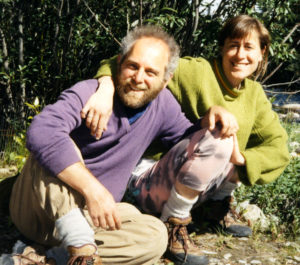What do German Chancellor Angela Merkel and Canadian Angela Bischoff have in common?
Aside from the same first name, both are opposed to nuclear energy. Merkel reversed her government’s position to maintain nuclear reactors following the Fukushima Daiichi Nuclear Power Station disaster on March 11, 2011, that released huge amounts of radioactivity into the atmosphere and the Pacific Ocean.
If Canada had followed Merkel’s example, Bischoff would be out of a job. She is the Ontario Clean Air Alliance (OCAA) outreach director charged with raising awareness of the safe and inexpensive alternatives to nuclear energy.
On any given day Bischoff works on computer, generating communications for her social-media friends and followers, for members of the Ontario Legislature, for the still-effective media, and anyone else concerned about a healthy planet. Premier Doug Ford, are you listening?
“We regularly visit Members of Provincial Parliament, produce reports that critique public policy and provide solutions, distribute literature, communicate to our subscribers and through social media, and speak at public events and the media,” says Bischoff, a seemingly-tireless activist.
At present, she and the OCAA are working to ween Ontario off of nuclear power. Yet, it is a battle against powerful economic forces that use scientists in their denial campaigns.
“Nuclear denial creates scientific ambiguity that provides cover for governmental and commercial interests and allows nuclear power to continue expanding worldwide,” wrote retired Yale professor Charles Perrow, in Nuclear Denial: From Hiroshima to Fukushima in the Bulletin of Atomic Scientists.
Ontario Power Generation is spending $12.8 billion alone to refurbish their Darlington nuclear power plant. In their 6-page February 23, 2017 promotional supplement published in the Toronto Star, they carefully avoid the words Fukushima and accidents.
But Bischoff is well-aware of what she is up against. She’s gone up against big players before – and won.
“OCAA started out in 1997 as a small coalition of health, environmental and consumer groups committed to phasing out Ontario’s coal-fired power plants. After just a few years of strategic political advocacy, the government of the day committed to the coal phase-out, and successive governments have honored that goal,” says Bischoff.
“It took 17 years to shutter all five coal stations, but we won, and Ontario now leads the world as the first jurisdiction to phase out coal for environmental and health reasons. Now Canada and many other jurisdictions around the world are following Ontario’s lead.”
Although 17 years is hardly quick, Bischoff remains the eternal optimist, maintaining her balance through incorporating a healthy life regimen.
“I love my work, the people I work with, and my family and community – that is, I’m not isolated. Every day I ride my bike, stretch, eat well, play piano, sing and dance – all of these bring health and balance into my life, critical for avoiding burn out,” she says.
To make advances against the nuclear industry requires vision, persuasion, and perseverance. Her argument against nuclear power is pretty persuasive.
“After winning that campaign (against coal) we turned our attention to phasing out Ontario’s eighteen working nuclear reactors,” says Bischoff. “They’re all old – some well past their original design life – and will need to be replaced in the next decade; we’re advocating that they be replaced with 100% renewable power through a combination of lower cost conservation, wind, solar, and water power from Quebec.”
 Her ability to motivate people has been long in gestation.
Her ability to motivate people has been long in gestation.
“In my school days I was interested in social justice and international development. But in 1987 I met a man of action – Tooker Gomberg – who rocked my world and later became my husband. Together we advocated for better bicycle facilities, and then we co-founded EcoCity Society, a civil society organization committed to greening Edmonton,” she recalls.
She and Gomberg (who served one term as an Edmonton City councillor) embarked on a multi-year long bicycle tour of the world, documenting their experiences on the Greenspiration.org blog
“Besides being motivated by love for my man, I was motivated by love for the planet and my community. It was never about making money,” says Bischoff. “I followed my heart, put my principles into action, and have been blessed in return with a basic income, meaningful work, and a beautiful community of like-minded planet lovers making a difference.”
Her husband took his own life in 2004 following bouts of depression and being medicated on dangerous anti-depressants. After Gomberg’s tragic passing, Angela immersed herself in issues of mental health, sustainable activism, big-pharma, and the dangers of antidepressant drugs. She published a newspaper called Depression Expression and made presentations across the country on the Healthy Mind Body Planet Tour.
Although being an environmentalist can carry a lot of pressure, Bischoff keeps things in perspective.
“Tooker used to say that he was planting seeds – some would sprout, others not. My current boss says he can’t save the world, but he can try to shutter coal and nuclear. In other words, we can be very ambitious, but we don’t have to carry the world on our shoulders.”
 Bischoff, a University of Alberta sociology grad, sees hope and progress ahead.
Bischoff, a University of Alberta sociology grad, sees hope and progress ahead.
“There were no bike lanes when I started advocating for them, no bike racks on buses, no green roofs, no municipal recycling or composting, no smoking bylaws, and little public awareness of enviro problems. That was pre-internet days. Now the tables have turned and there is massive public awareness, environmental legislation that protects farmland, waterways and endangered species, growing demand for organic and vegetarian food, zero waste jurisdictions, cities committed to 100% renewable energy, bike lanes, EVs, and green energy replacing fossil fuels around the world. The bigger question is, is it too little too late? I’m holding out hope for a Green New Deal to kickstart a revolution in climate action in Canada and the US.”
And Merkel’s Germany is one country leading the revolution. They have in place something called Energiewende (energy transition.) Bischoff would like Ontario to be Canada’s leader. Her message for Ontario Premier Ford is simple:
“Mr. Ford, you’re committed to reducing electricity bills in Ontario by 12%. Here’s how you could it: cancel the nuclear rebuilds and replace them with lower cost conservation and water power from Quebec. That move alone could save Ontarians tens of billions of dollars and lower bills. Plus doing so would be very popular because polls show that people favour water power over every other form of power and dislike nuclear more than any other. Not only would you save Ontarians billions of dollars, but you’d be seen as an environmental leader while avoiding a catastrophic nuclear accident in the middle of the Greater Toronto Area, something always hanging over our city.”
No question, preventing a Canadian Fukushima makes a lot of sense.
Photos courtesy of Angela Bischoff.










A worthy portrait!
An amazing person; a visionary and bold, strategist ; Angela Bischoff has risen to become a strong leader who continues to try to bring sanity to Ontario’s wild nuclear landscape where corporate greed and industry intransigence will likely push the province to an economic disaster.
I applaud Angela for the initiatives that she has helped promote. However I disagree with her opposition to nuclear. CANDU reactors are the safest in the world and accidents such as those mentioned in the article could not occur with our type of reactor. Since hydro electric power (water generated power) is maxed out in Ontario. Nuclear is the choice for safe RELIABLE power generation. Solar and Wind need more work to become reliable.
Bob U.
Quebec is maxed out on hydro. Ontario sells power to Quebec in the winter. Hydro in Ontario is maxed out. Wind mills and solar panels don’t produce. Gas plants are large CO2 emitters. Unless we remove half of the planets population or go back to the Stone Age we need something realistic – NUCLEAR – not hysteric banter. More electric cars would be a great start but we need something for them to plug into – NUCLEAR.
Angela Bischoff should be aware that coal was able to be phased out in Ontario because of the ability of nuclear to reliably and cost effectively take over. Nuclear power does not negativity impact Ontario’s clean air.
If Angela Bischoff is being honest with the public, the groups name should has to be changed.
If other forms of mass power production are made available at competitive rates, they will be welcomed to the market. These are the same reasons we don’t have wind powered or solar powered cars. They can’t fulfill the needs of the customers.
The logical choice is the one that is able to do the job with the least impact until a better choice is available. The best choice for the time being is nuclear.